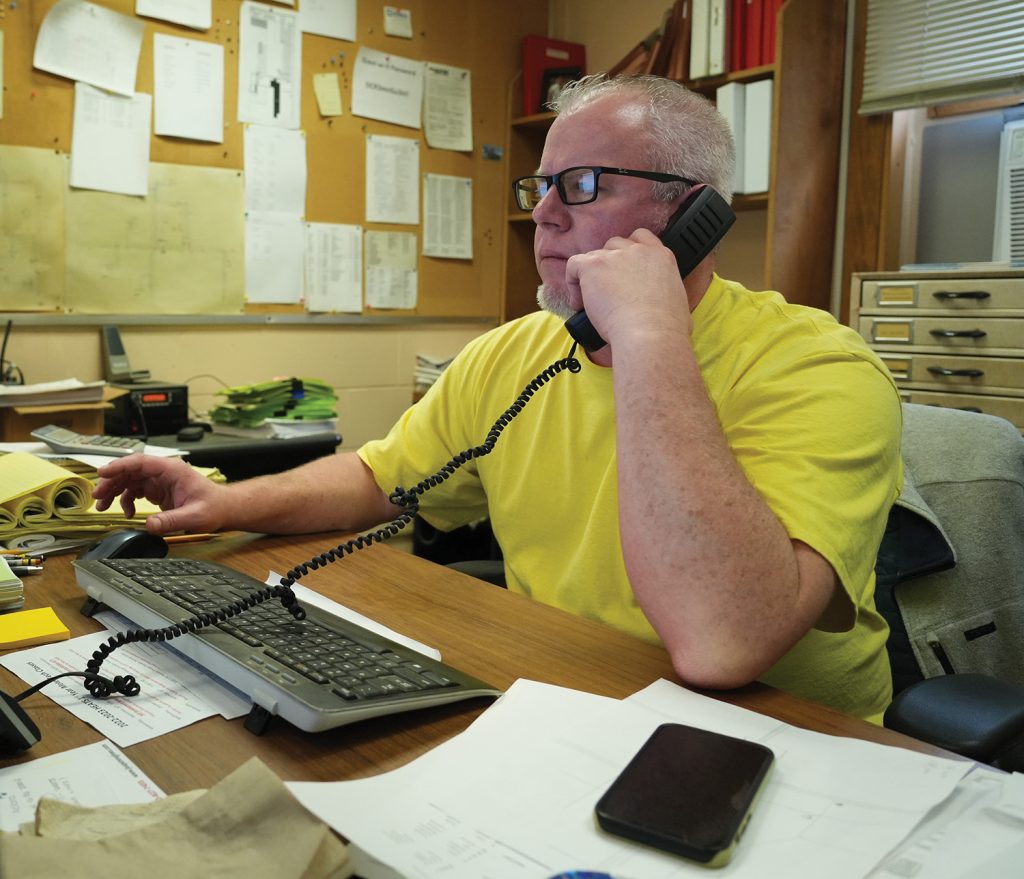
By Pat Nobbe
We do our best to avoid them, but sometimes there’s no way around it: Power outages happen. For most of our members, outages do not happen often and only last a few hours. But when major storms, like last month, impact our area, extended outages are unavoidable.
During the four-day event that hit the southern half of our system, crews worked hard to restore service to over 2,000 total members.
So, when the power goes out, how do Decatur County REMC crews know where to start working? How do you know if your outage has been reported? We’ve got answers to these questions and more, and it all starts with a safe, efficient plan for power restoration.
When the lights go out and it’s safe for our crews to begin the restoration process, they start by repairing power lines and equipment that will restore power to the greatest number of people in the shortest time possible.
This process typically begins with repairs to the main feeder lines starting at the substation and tap lines which service a great number of homes and businesses. After those repairs are made, we check individual service lines that run between the transformer and the meter and make those repairs.
We can’t control the weather, but we can prepare for it. We keep a supply of extra utility poles, transformers and other equipment on hand so we can quickly get to work in the event of an outage. When widespread outages occur, all our crews will be out in the field simultaneously working to repair damage at multiple locations. We also coordinate with nearby co-ops to bring in additional crews when necessary.
A proactive approach to maintenance helps minimize the chance of prolonged outages; this is why you see tree trimming and clearing of vegetation near rights-of-way. We love trees too, but it only takes one overgrown limb to knock out power for an entire neighborhood. In addition to managing vegetation, we regularly inspect utility poles, power lines and other critical equipment to maintain a more reliable system.
If you experience a power outage, don’t assume a neighbor reported it. It’s best to report the outage yourself, and we make it easy to do. The quickest way to report an outage is through our app or online through SmartHub; you can also call our outage reporting number at 800-844-7362.
If you have a medical condition that requires electrical equipment, please let us know, and always have a backup plan in place. This plan could include a portable generator, extra medical supplies or moving to an alternate location until power is restored. If you plan to use a generator for backup power, read all safety information and instructions before use, and make sure you let us know. We want to make sure it is grounded correctly and there are no backfeed issues.
Mother Nature can be unpredictable, but as a member of Decatur County REMC, you can feel confident knowing we’re standing by, ready to restore power as quickly and safely as possible.
I’d also like to answer some questions I get asked frequently:
What should I do if I encounter a downed power line?
If you see a downed power line, move at least 10 feet away from the line and anything touching it. The human body is a ready conductor of electricity.
The proper way to move away from the line is to shuffle away with small steps, keeping your feet together and on the ground at all times. This will minimize the potential for a strong electric shock. Electricity wants to move from a high voltage zone to a low voltage zone — and it could do that through your body.
What can I do to help someone who has come in contact with a downed power line?
If you see someone who is in direct or indirect contact with the downed line, do not touch the person. You could become the next victim. Call 911 instead.
Can I use something that is not metal to try to move a downed power line myself?
Do not attempt to move a downed power line or anything in contact with the line by using another object such as a broom or stick. Even non-conductive materials like wood or cloth, if slightly wet, can conduct electricity and then electrocute you.
What should I do if I see a downed power line in the street while I am driving my car?
Do not ever drive over downed power lines.
What if a power line comes down onto my car or I didn’t see it until I’ve driven into it?
If you are in your car and it is in contact with the downed line, stay in your car. Tell others to stay away from your vehicle.
If you must leave your car because it’s on fire, jump out of the vehicle with both feet together and avoid contact with the car and the ground at the same time. This way you avoid being the path of electricity from the car to the earth. Shuffle away from the car.
I bought a new generator so that I’d be prepared for the next power outage. Is there anything special I should know about installing it?
ESFI strongly recommends that a licensed electrician install home generators to ensure they meet all local electrical codes.
Also, make sure your generator is properly grounded in accordance with the manufacturer’s instructions.
Can’t I just plug my generator directly into one of my home’s outlets?
Do not connect generators directly to the household wiring unless an appropriate transfer switch has been installed by a licensed, qualified electrician.
What could happen if I don’t have a transfer switch installed?
Without the proper transfer switch, power provided by the generator can “backfeed” along the power lines, creating a significant electrocution hazard for anyone coming in contact with the lines, including lineworkers making necessary repairs.
PAT NOBBE is operations manager at Decatur County REMC.



